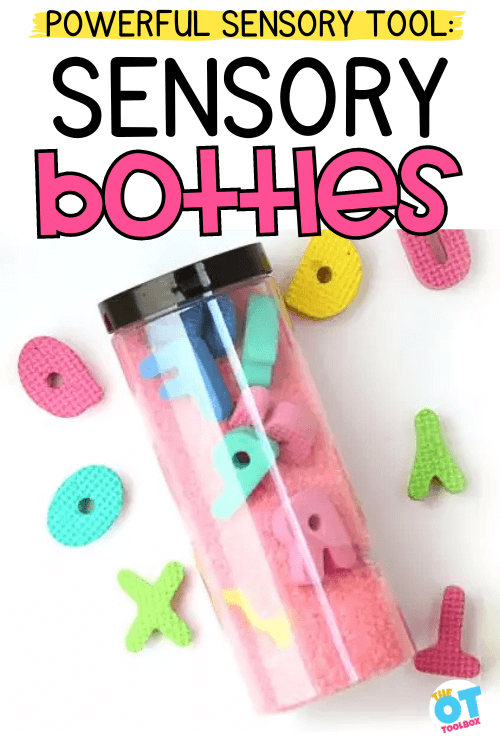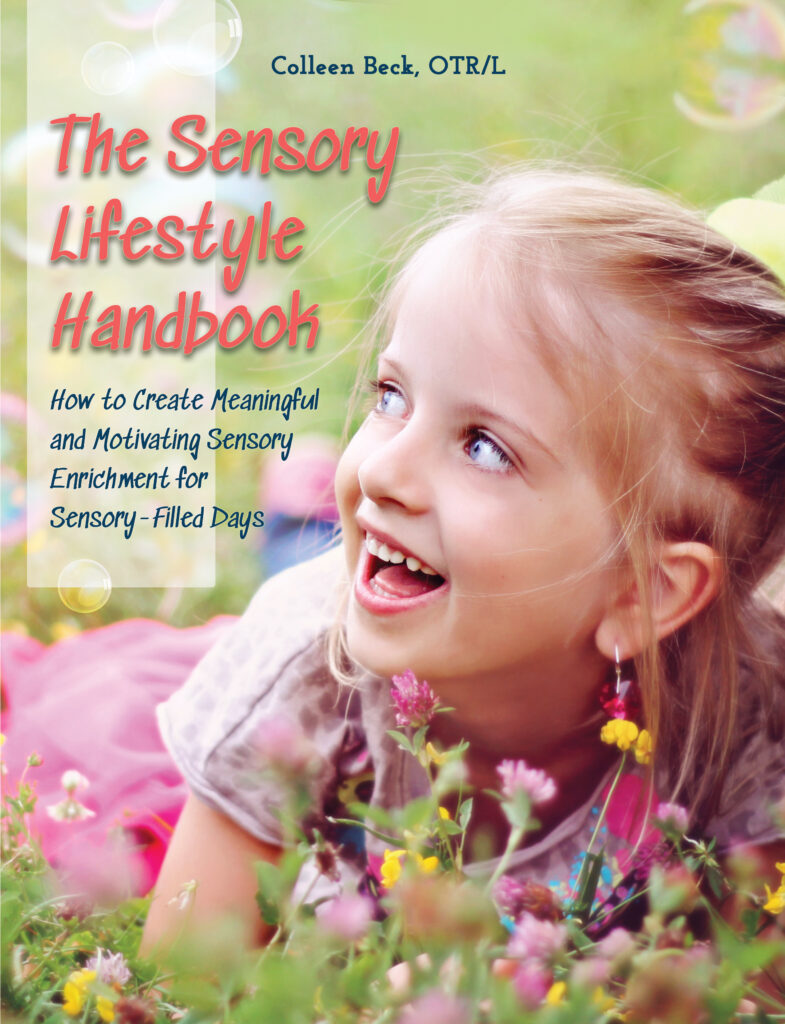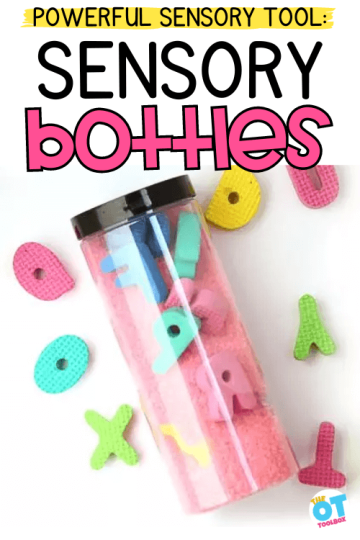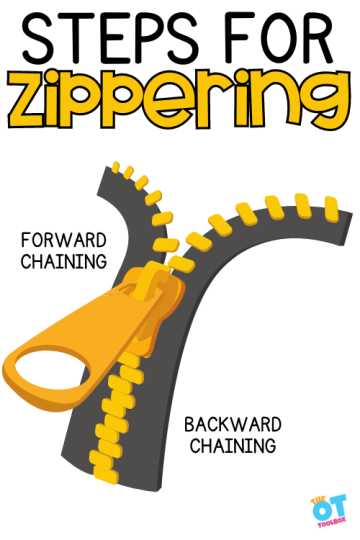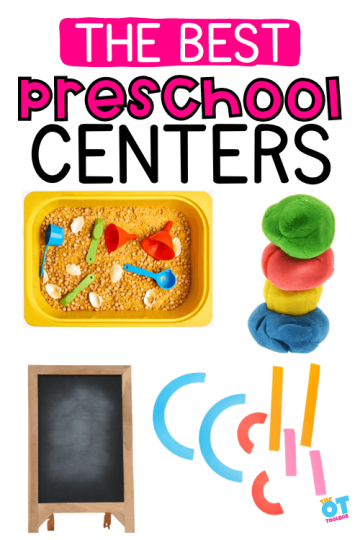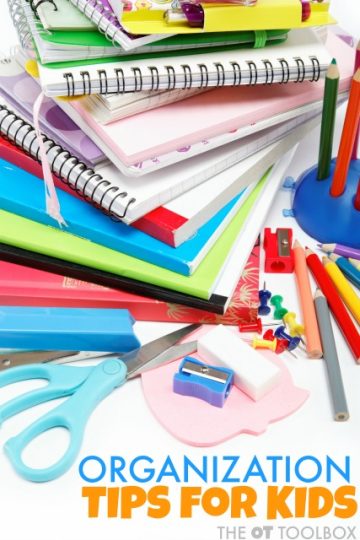In this blog post, we cover resources on adult sensory processing disorder. So often, as occupational therapists, it’s the pediatric realm that we thing about regarding SPD (sensory processing disorder). However, due to more overall knowledge of sensory processing disorder in adults, access to sensory processing disorder information, and increasing diagnoses among adults, there is more awareness. In this blog post, we’ll cover what sensory processing disorder looks like in adults, sensory overload in adults, and how to support sensory sensitive adults.
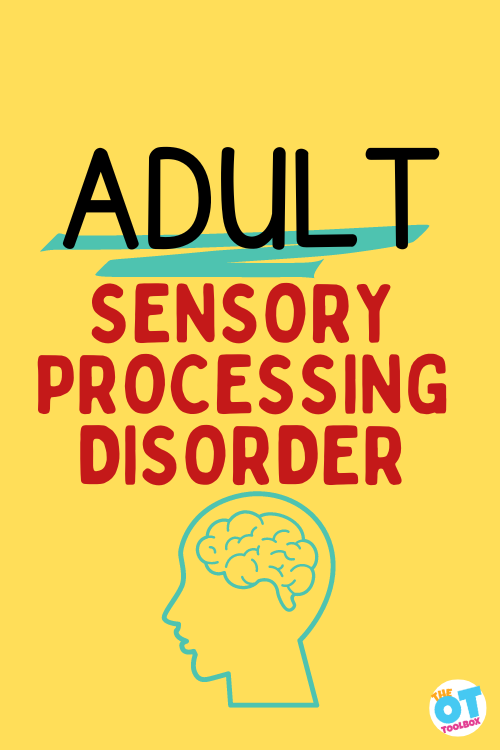
As an Amazon Influencer, I earn from qualifying purchases.
When it comes to sensory processing disorder, adults may struggle just as much as children. There is no better time than now to get adults the resources and tools they need to support sensory processing challenges that impact functioning.
We all have a personal bubble, or comfort area when it comes to personal space. All of us have some level of comfort that just becomes “too much” or “too little”. Think about riding a crowded elevator. When you are in that crowded, small space for more than a minute or two, the awareness of how close others are to you becomes very apparent. Being aware of sensory processing in adulthood is a lot like that awareness!
Sensory Processing Disorder in Adults
A reader reached out recently and requested information related to adults with sensory processing disorder. Below is curated content on adults with sensory processing difficulties to accommodate sensory needs in order to live full and functional lives.
Note: The information included below (and, like everything on this website) is not a substitute for therapy assessment, intervention, or medical advice. Please contact a physician or Occupational Therapist to assess and intervene.
Start here by grabbing the Sensory Processing Disorder Information booklet. It’s a great resource that offers information on an overview of sensory processing disorder for all ages.
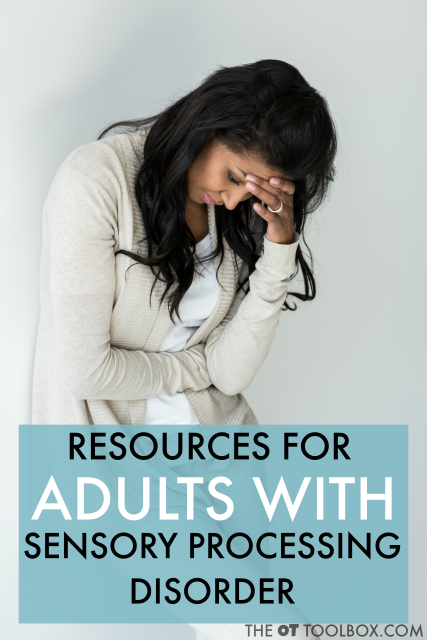
Adult Sensory Processing Disorder
This post contains affiliate links.
In this day, many of us are more informed on everything! The internet and accessibility of information allows us to be knowledgeable beings more so than in past generations. At our fingertips is the ability to ask any question and receive immediate answers. It might be because of this that more and more adults are recognizing their own sensory issues or needs.
About 5-16% of children live with sensory processing disorder. When we think about adults who may have been suffering with undiagnosed sensory processing disorder, there are potentially many, many more individuals who struggle with sensory challenges.
Sensory processing disorder typically presents itself as a response in various, but common ways:
- Tactile Functioning- Clothing, being in crowds, light or unexpected touch, etc.
- Vestibular Functioning- Riding in cars, elevators, escalators, uneven surfaces when walking, flying, amusement park rides, etc.
- Auditory Functioning- Loud or sudden sounds, sounds that don’t normally affect others like chewing, fingernail clipping, etc.
- Motor Functioning- Clumsy with gross motor tasks including driving, operating the vacuum, movement changes, etc.
Online Resources for Adults with Sensory Processing Differences
There is a lot of information related to adult sensory processing disorder available online. These resources include:
- Sensory overload tests
- Sensory processing disorder adults quizzes
- sensory integration therapy for adults
- Adult sensory processing checklists
- Adult SPD fact sheets
We’ve pulled the best of these resources below:
1. Adult Sensory Processing Differences Self-Tests- This self-test can help adults understand and identify sensory challenges they may experience.
2. Adult Sensory Processing Checklists- Here is another checklist for adolescents and adults to identify potential red flags of sensory processing disorder. This checklist is broken down into sensory modulation issues, sensory discrimination difficulties sensory-motor struggles, social or emotional regulation challenges, and internal regulation difficulties.
3. Sensory Processing Checklist for Adults- Here is another, more extensive checklist for adults who suspect sensory processing issues.
4. Sensory Processing Differences Fact Sheet- This fact sheet from AOTA
5. Read up on Ayres Sensory Integration to gain more insight into the theory of sensory integration.
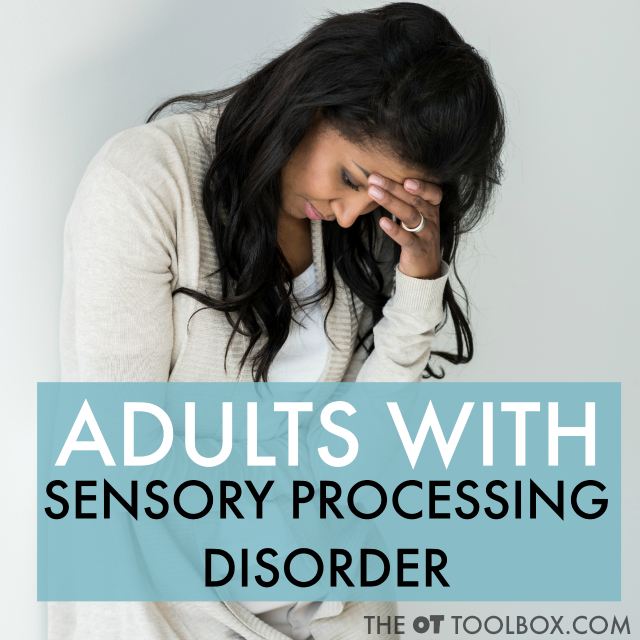
Sensory Processing Disorder Books for adults with SPD
It’s very possible that adults with sensory processing differences had the challenges and sensory sensitivities as a child. As an adult, these sensory challenges may impact work, adult-appropriate self-care tasks, Instrumental Activities of Daily Living (IADLs) like caring for the home, navigating in the community, caring for children, or many other aspects of adulthood.
Compounding the sensory overload that may occur in adults, we have greater demands: paying bills, household management, keeping children’s schedules, work tasks, social media input, mental health needs, and many other issues that impact overall wellbeing.
We know that emotional regulation is related to executive functioning skills, meaning that challenges with “keeping it together” when sensory overload occurs impacts cognitive skills like problem solving, managing time, staying organized, setting priorities, planning and organizing, prioritizing, initiating tasks, and adapting behaviors and actions to achieve goals.
It’s natural that as adults, we notice these sensory issues that impact daily functioning and with all of the information available, we can determine the need to seek out information that relates to us.
We wanted to pull together a list of resources that offer information on sensory processing disorder adults may experience on a day to day basis.
It’s important to note that self-diagnosis is not a substitute for professional evaluation and diagnosis by a qualified healthcare professional, if you think that sensory overload is something you experience as an adult.
Only a trained specialist can provide an accurate diagnosis of SPD or any other medical condition. With that in mind, here are some things you can potentially learn from a book on the topic:
- Understanding SPD: Books on SPD can provide you with an in-depth understanding of what sensory processing disorder is, its symptoms, and how it affects individuals. It can explain the different types of sensory processing difficulties, such as hypersensitivity or hyposensitivity, and how they can manifest across various sensory modalities (e.g., auditory, visual, tactile, etc.).
- Common Signs and Symptoms of Adult SPD: A book might outline common signs and symptoms associated with SPD. It can describe how individuals with SPD may struggle with processing sensory information, leading to challenges in daily life activities and interactions. This can include difficulties with sensory modulation, discrimination, and sensory-based motor skills.
- Case Studies and Personal Experiences: Many books on SPD include case studies and personal experiences shared by individuals who have been diagnosed with or have lived with SPD. These stories can provide valuable insights into the challenges faced by individuals with SPD and help you relate your own experiences.
- Sensory Screening Tools and SPD Checklists: Some books may include self-assessment tools or questionnaires that can help you understand your own sensory processing patterns. These tools can guide you in identifying areas of sensory sensitivity or sensory-seeking behaviors that you might exhibit.
- SPD Coping Strategies: A book on SPD can provide strategies, techniques, and interventions that can help individuals manage sensory processing challenges. These might include environmental modifications, sensory diet plans, mindfulness techniques, or occupational therapy exercises that can be beneficial.
- Professional Resources and SPD Support: Books can also provide information about professional resources, such as licensed occupational therapists or sensory integration specialists who specialize in assessing and treating SPD. They may also recommend support groups or online communities where you can connect with others who have similar experiences.
These sensory processing disorder books can support the individual seeking information on sensory issues in adults:
Amazon affiliate links are included below.
- The Sensory Lifestyle Handbook by Colleen Beck, OTR/L
- Too Loud, Too Bright, Too Fast, Too Tight: What to Do If You Are Sensory Defensive in an Overstimulating World by Sharon Heller, PhD
- The Out-of-Sync Child Grows Up: Coping with Sensory Processing Disorder in the Adolescent and Young Adult Years by Carol Kranowitz
- Uptight & Off Center: How Sensory Processing Disorder Throws Adults Off Balance & How to Create Stability by Sharon Heller PhD
sensory overload in adults
So, if you think you may have tendencies toward sensory processing challenges that impact daily task completion, it might be beneficial to take stock of what’s occurring in your daily life. We’ve previously covered sensory processing red flags for children, and that’s a good place to start, because many of the signs of sensory overload can exist through adulthood. A checklist of signs of sensory overload can be one way to start identifying needs.
Sensory overload in adults can look different than sensory overload in children, however. Adults have greater tasks, more complex daily tasks, often juggling work, caring for children, social media input, and much more. All of this together impacts sensory overload in addition to the considerations listed below. The compounding effect is monumental.
Adding to the impact is the effect on the whole family. Family wellness, when stressed, affects the overall family dynamics and well-being in several ways:
- Stress levels
- Participation in activities
- Emotional impact and trauma
- Strained relationships
Each of these areas carries over to the children and other members of the family.
Signs of sensory overload in adults (remember that not all of these sensory challenges will exist for every individual and that the existence of one or more of the following signs are not an indication of SPD):
- Hypersensitivity (over-responsiveness) to sensory stimuli such as noise, touch, light, smell, or movement
- Hyposensitivity (under-responsiveness) to sensory stimuli such as noise, touch, light, smell, or movement
- Seek out intense sensory experiences, such as constantly touching objects or seeking deep pressure.
- Avoid certain sensory experiences, such as avoiding certain textures, sounds, or movements
- Certain types of sensory inputs are overwhelming or distracting
- Struggles with transitions and changes in routine
- Difficulty filtering sensory information-feeling overwhelmed by sensory input
- Sensory overload or fatigue when exposed to excessive or prolonged sensory stimulation
- Difficulty concentrating as a result of stimulation from the environment
- Feelings of stress, anxiety, irritability
- Difficulty focusing on relevant details
- Difficulty shifting their attention
- Easily distracted or overwhelmed by sensory input
- Trouble adapting to new environments
- Difficulty focusing or concentrating on tasks
- Trouble staying calm
- Constantly fidgeting
- Constantly seeking tactile stimulation
- Constantly seeks out specific sensory experiences (e.g., rocking, spinning, touching things)
- Feeling overwhelmed in noisy or crowded environments
- Overwhelmed by bright lights
- Challenges with social interactions
- Heightened anxiety, stress, irritability, or mood swings in response to sensory triggers
- Difficulty with transitioning between tasks
- Struggles with personal space boundaries
- Feeling overwhelmed by strong smells or textures
- Intense emotional responses to situations
- Difficulties with motor tasks that require coordination
- Feelings of “meltdown”
- Aversions to certain tastes or textures
- Difficulty with engaging in conversations in noisy environments
- Difficulties tolerating textures of toothpaste or foods
- Unable to tolerate certain textures of clothing
- Difficulty interpreting non-verbal cues from others in social situations
- Challenges with engaging in daily tasks
sensory issues in adults at the workplace
Because of the demands of everyday life, work must happen even when sensory issues impact the day to day! An adult with Sensory Processing Disorder (SPD) may face various challenges in the workplace, depending on the sensory input that occurs, job requirements, and levels of sensory processing needs.
These sensory sensitivities can lead to dysregulation that impacts job performance. Some of the ways in which an adult with SPD may struggle at work might include:
- Sensory overload at work- Work environments can be sensory-rich and overwhelming for individuals with SPD. The presence of bright lights, loud noises, strong smells, or open office layouts can lead to sensory overload, making it difficult to concentrate, stay focused, and process information effectively.
- Difficulty filtering distractions– Adults with SPD may have difficulty filtering out irrelevant sensory information and may be easily distracted by background noises, office chatter, or visual stimuli. This can make it challenging to maintain attention on tasks, leading to reduced productivity and increased errors.
- Sensory sensitivities in the workplace- Sensory sensitivities can affect an individual’s comfort and ability to engage in certain work-related activities. For example, individuals with tactile sensitivities may struggle with wearing certain types of clothing or using equipment with specific textures. Sensitivities to smells or sounds may make it challenging to tolerate certain workplace conditions or tasks.
- Motor coordination challenges impacting the job- Some adults with SPD may experience difficulties with fine motor skills, gross motor skills, or both. Fine motor challenges can impact tasks that require precise hand movements, such as typing, writing, or using small tools. Gross motor challenges may affect activities that require coordination or balance, potentially impacting jobs that involve physical tasks.
- Work Transitions- Individuals with SPD may struggle with transitions and changes in routine. This can make it difficult to adapt to new tasks, switch between projects, or handle unexpected changes in the work environment. These challenges can lead to increased stress, anxiety, and difficulty adjusting to workplace demands.
- Social Interactions in the Workplace- Some individuals with SPD may face challenges in social interactions at work. Difficulties with interpreting non-verbal cues, maintaining appropriate personal space, or understanding social dynamics can make it challenging to build relationships with colleagues or navigate workplace communication effectively.
- Emotional Regulation in work situations- Sensory processing difficulties can impact emotional regulation, leading to heightened stress, anxiety, or emotional outbursts. Workplace stressors and sensory triggers can contribute to difficulties in managing emotions, potentially affecting interactions with coworkers and overall job satisfaction.
Support for Adults with SPD
For the adult with sensory processing differences, there is support. Awareness and understanding is one of the biggest steps one can take!
Adults who have always had sensory sensitivities may be more aware or have access to information that wasn’t in place when they were a child. Looking into diagnoses such as Autism or ADHD can be part of the overall plan to seek support.
From there, coming up with coping strategies is essential to daily task and work completion.
Implementing a Sensory Diets for Adults can be a powerful too to support sensory needs.
When sensory differences impact work, requesting workplace accommodations, such as adjustments to the physical environment or flexible work schedules, can help create a more supportive and inclusive work environment.
Finally, working with healthcare professionals, such as occupational therapists, OTAs, or psychologists can also provide strategies and support tailored to managing SPD challenges in the workplace.
References:
May-Bensen, T. “Occupational Therapy for Adults with Sensory Processing Disorder”. OT Practice. June 2009: 15-19.
The Sensory Lifestyle Handbook walks you through sensory processing information, each step of creating a meaningful and motivating sensory diet, that is guided by the individual’s personal interests and preferences.
The Sensory Lifestyle Handbook is not just about creating a sensory diet to meet sensory processing needs. This handbook is your key to creating an active and thriving lifestyle based on a deep understanding of sensory processing.

Colleen Beck, OTR/L has been an occupational therapist since 2000, working in school-based, hand therapy, outpatient peds, EI, and SNF. Colleen created The OT Toolbox to inspire therapists, teachers, and parents with easy and fun tools to help children thrive. Read her story about going from an OT making $3/hour (after paying for kids’ childcare) to a full-time OT resource creator for millions of readers. Want to collaborate? Send an email to contact@theottoolbox.com.

